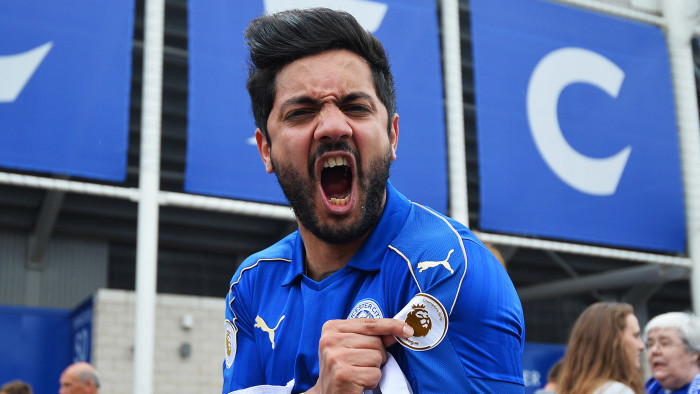Can Leicester City become a global brand?

Roula Khalaf, Editor of the FT, selects her favourite stories in this weekly newsletter.
Just three days after Leicester City stormed to an unlikely English Premier League title in May, the club shop put next season’s replica shirts on sale.
The new shirts bore a small but important change: a gold badge on the sleeve to denote the club’s champion status. They sold out in minutes. Puma, the kit sponsor, plans to raise production to have 90,000 shirts on sale by the time the new season kicks off in August.
Leicester’s triumph caught the imagination even of people who do not follow football. Companies, meanwhile, were quick to link themselves to the club.
Supermarket chain Asda created a “Vardy Cardy”, a cardigan in royal blue, the team colour, named in honour of chief goalscorer Jamie Vardy. Captain Morgan issued a limited edition bottle of its rum with the face of Wes Morgan, team captain, on the label. Walkers Crisps, based in the city, took out a page advertisement in the Sun newspaper featuring Gary Lineker, the ex-England striker, a Leicester fan and the long-serving face of Walkers’ advertising.
In addition to the substantial television and other revenues they would expect to earn as a Premiership club, Leicester City could earn hundreds of millions of pounds next season from having qualified for the European Champions League and improved sponsorship and marketing deals.
The club, however, has to be nimble. Its star could fade if it suffers a loss of form when the new season begins, giving it a matter of months to reach as many agreements as possible.
“They have to capture the impact quickly,” says Patrick Nally, a sports marketing executive who helped Fifa, the world’s chief football body, to build its commercial model. “Their window is six to eight months. I hope they have already planned to respond . . . This is an opportunity for Leicester to expand, particularly through Asia,” he adds, mentioning China in particular.
The club — controlled by the owners of Thai duty-free company King Power since 2010 — has moved quickly to consolidate its south-east Asian links. It has a tie-up with the British government export agency, UK Trade and Investment, to host trade missions to Thailand. Shortly after the season ended, the team drew a crowd of more than a million people during a tour of Bangkok.
King Power is looking for a sharp increase in its revenues as it expands further into Asia. “From King Power’s view”, says Mike Dalzell, Leicester city council’s director of tourism, culture and inward investment, things have “gone bananas”. The value to the company of the publicity that the club is enjoying is huge, he adds. The council is keeping a file of media coverage on the club and the city, from Saudi Arabia to Argentina and from Norway to Japan.
The number of the club’s followers online has grown dramatically. Brandtix, which analyses social media exposure, says it saw Leicester City’s following rise from 2m across Facebook, Twitter and Instagram to 5.6m as it clinched the Premiership title.
Many of Leicester’s new fans are overseas, hence giving the club the chance to sign up foreign “partners”. While Leicester City’s sponsorship with its owners King Power is worth £1m a year, Manchester United, by comparison, earns an annual $70m from its deal with US carmaker Chevrolet. Chelsea recently signed a £60m-a-year kit deal with Nike.
If Leicester City can consolidate a global fan base, it will open a route to multiple sponsorship regions and categories.
A key role model is Manchester United, one of a growing number of UK and European clubs including the likes of Barcelona, Real Madrid and Bayern Munich, which has already pioneered this lucrative international strategy. Manchester United has both “global sponsors” and “regional partners”. Among the club’s deals are one with Honda to be the company’s official motorcycle partner for Thailand and another with drinks company CHI to be its official soft drink partner for Nigeria. Unilever is Manchester United’s official male shampoo partner in Indonesia.
Transfer dealing before next season will be critical. Leicester City does not have the superstar footballers of its top rivals and very few of its players are household names. The club declined to comment on its commercial strategy for the year ahead.
The city council points out that it is drawing up its own plans for the next 12 months. The city was already focusing on tourism in the wake of the discovery nearly four years ago of the skeleton of King Richard III under a local car park. Mr Dalzell says the football club has supercharged the city’s international profile.
The number of tourists visiting Leicester has “expanded significantly” over the past 12 to 18 months, he says, with hotel occupancy above 80 per cent. From 9.5m tourists in 2013, the city projects a rise to 13.6m by 2020.
Champions League fixtures will present big marketing opportunities. The council expects each home game to attract up to 4,000 relatively affluent away fans.
“We are really concentrating on providing a welcome to them and the journalists and making sure they have a great time,” says Mr Dalzell.
Comments